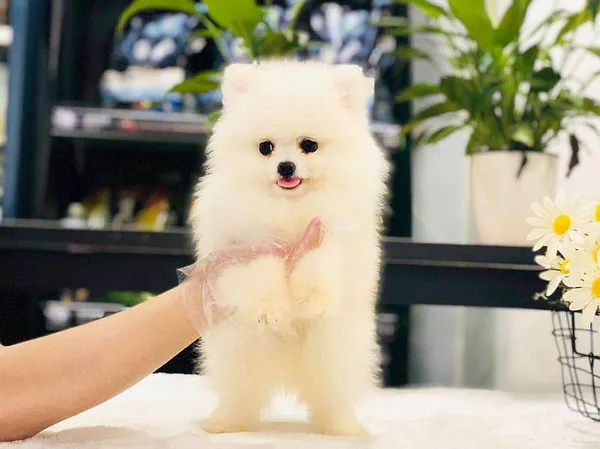Brushing a Pomeranian‘s fur is an essential part of grooming that helps maintain their coat’s health, appearance, and overall well-being. Pomeranians, known for their fluffy double coats, require regular brushing to prevent matting, remove loose hair, and distribute natural oils. This comprehensive guide covers everything you need to know about brushing your Pomeranian’s fur effectively and safely.
Understanding Pomeranian Fur: Types and Characteristics
Pomeranians have a double coat consisting of a soft, dense undercoat and a longer, harsher outer coat. This coat type helps protect them from varying weather conditions and provides insulation. Understanding the structure of their fur is crucial for choosing the right grooming tools and techniques.
Tools for Brushing
Before you begin brushing your Pomeranian, gather the necessary tools:
Slicker Brush: Ideal for removing mats and tangles from the coat.
Pin Brush: Helps detangle and smooth the outer coat.
Comb: Used to check for remaining tangles and ensure thorough brushing.
Grooming Spray (Optional): Can be used to lightly mist the coat to prevent static and ease brushing.
Treats or Rewards: Useful for rewarding your Pomeranian and making grooming a positive experience.
Preparing Your Pomeranian for Brushing
Before you start brushing, it’s important to prepare your Pomeranian both physically and mentally:
Choose a Quiet Environment: Select a calm, quiet area where your Pomeranian feels relaxed.
Gentle Handling: Approach your Pomeranian calmly and gently to avoid causing anxiety or discomfort.
Positive Reinforcement: Use treats and praise to reinforce good behavior and create a positive association with brushing.
Step-by-Step Guide to Brushing Your Pomeranian’s Fur
Follow these steps to brush your Pomeranian’s fur effectively:
1. Start with the Slicker Brush
Gently Brush the Undercoat: Begin brushing the soft undercoat with a slicker brush, working in small sections. Brush in the direction of hair growth, starting from the neck and moving towards the tail.
Focus on Tangles and Mats: Pay special attention to areas prone to tangling, such as behind the ears, armpits, and under the legs. Use gentle, short strokes to loosen and remove mats without pulling on the skin.
Use a Gentle Approach: Pomeranians have sensitive skin, so avoid applying excessive pressure with the slicker brush. Brush with light, even strokes to prevent discomfort.
2. Transition to the Pin Brush
Smooth the Outer Coat: Once you’ve brushed the undercoat, switch to a pin brush to smooth the outer coat. Brush in the same direction as before, ensuring you reach all parts of the coat, including the chest and legs.
Detangle with Care: Use the pin brush to gently detangle any remaining knots or tangles. Work through the coat methodically, using gentle motions to avoid pulling or causing discomfort.
3. Check with a Comb
Inspect for Remaining Tangles: After brushing with the pin brush, use a comb to carefully inspect the coat for any remaining tangles or mats. Comb through the fur in sections, starting from the head and moving towards the tail.
Address Any Issues: If you encounter stubborn tangles, use the comb to gently separate them. Avoid pulling or tugging on the hair, as this can be painful for your Pomeranian.
4. Final Touches and Inspection
Smooth and Even Coat: Once you’ve brushed and combed the entire coat, use your hands to feel for any remaining rough patches or mats. Smooth out the fur with gentle strokes to ensure an even appearance.
Inspect for Skin Issues: While grooming, check your Pomeranian’s skin for any signs of irritation, redness, or parasites. Address any concerns promptly and consult your veterinarian if you notice anything unusual.
Tips for Effective Brushing
Establish a Routine: Develop a regular grooming schedule to keep your Pomeranian’s coat in top condition. Aim to brush at least two to three times a week, or more frequently during shedding seasons.
Be Patient and Gentle: Take your time when brushing your Pomeranian’s fur, especially around sensitive areas. Use gentle movements to prevent discomfort and build trust with your dog.
Use Treats and Rewards: Reward your Pomeranian with treats and praise throughout the grooming process to reinforce positive behavior. This will help make brushing a pleasant experience for both of you.
Monitor Coat Changes: Keep an eye on changes in your Pomeranian’s coat texture, thickness, or color. These could indicate health issues that require attention from a veterinarian.
Common Grooming Challenges and Solutions
1. Dealing with Mats and Tangles
Prevention: Regular brushing and using a slicker brush can help prevent mats from forming.
Treatment: For existing mats, use a detangling spray or conditioner to gently loosen them before carefully brushing them out.
2. Managing Shedding
Regular Brushing: Brushing helps remove loose hair and reduces shedding around your home.
Supplements: Consider adding omega-3 fatty acids or a balanced diet to support healthy coat growth and reduce shedding.
3. Handling Sensitive Areas
Patience and Calm: Approach sensitive areas, such as the belly or feet, with patience and gentleness to avoid causing discomfort.
4. Skin and Coat Health
Nutrition: Provide a balanced diet rich in essential nutrients to support healthy skin and coat.
Regular Baths: Bathe your Pomeranian as needed with a mild dog shampoo to keep their coat clean and free of debris.
See also: How to Trim Husky Nails
Conclusion
Brushing your Pomeranian’s fur is not just about maintaining their appearance; it’s an essential part of their overall health and well-being. By following the steps and tips outlined in this guide, you can ensure that grooming sessions are enjoyable and beneficial for both you and your Pomeranian. Regular brushing helps prevent mats, reduces shedding, and promotes a healthy, shiny coat that your Pomeranian will proudly flaunt. Remember to approach grooming with patience, gentleness, and positive reinforcement to strengthen your bond with your furry companion.


